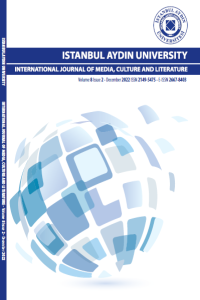Öz
Kaynakça
- Arney, W. R. (1980). [Review of Whose Life Is It Anyway?, by B. Clark]. Teaching Sociology, 8(1), 105–110. https://doi.org/10.2307/1317052 Clark, B. (1978). Whose Life Is It Anyway?. Avon books publishing. New York.
- Foucault, M. (1990). The History of Sexuality, Volume 1: The Will to Knowledge (R. Hurley, Trans.; R. Hurley, Rev. Ed.). Penguin Modern Classics.
- Foucault, M. (2004). The Birth of the Clinic: An Archaeology of Medical Perception (A.M. Sheridan, Trans.). Routledge Classics.
- Foucault, M. (1977). Discipline and Punish: The Birth of the Prison (A. Sheridan, Trans.). Penguin Modern Classics.
- Gutting, G. (2019). Foucault: A Very Short Introduction. Oxford.
- Ransom, J. S. (1997). Foucault’s Discipline: The Politics of Subjectivity. Duke University Press.
Öz
This article is based on Brian Clark's Whose Life Is It Anyway? (1980) and examines the play within the theoretical framework of Michel Foucault. By focusing on Foucault's concepts of power, discourse, and institutions, this study aims to explain how the play both reflects and questions social norms regarding individual autonomy. By analysing in detail, the characters' struggles within institutional structures and the impact of these institutions on their identities, it aims to highlight the complex tension between a person's sense of self and their existence under the dominant influence of institutions. The analysis offers insights into the profound effects of Foucault's theoretical work on the relationship between individuals and institutions in the play. At the center of the analysis are the institutional forces that shape and restrict the lives of the characters and the struggles of individuals against this power. By examining these struggles in detail, it is aimed to understand how these power relations within institutional structures affect the autonomy, stories, and choices of the characters. Foucault's theoretical foundations, especially his views on disciplinary mechanisms within institutions and the bodies of people under authority, shed light on the work done in this field.
Anahtar Kelimeler
Foucault Whose Life Is It Anyway? Institutional power Individual agency Discourse Resistance
Kaynakça
- Arney, W. R. (1980). [Review of Whose Life Is It Anyway?, by B. Clark]. Teaching Sociology, 8(1), 105–110. https://doi.org/10.2307/1317052 Clark, B. (1978). Whose Life Is It Anyway?. Avon books publishing. New York.
- Foucault, M. (1990). The History of Sexuality, Volume 1: The Will to Knowledge (R. Hurley, Trans.; R. Hurley, Rev. Ed.). Penguin Modern Classics.
- Foucault, M. (2004). The Birth of the Clinic: An Archaeology of Medical Perception (A.M. Sheridan, Trans.). Routledge Classics.
- Foucault, M. (1977). Discipline and Punish: The Birth of the Prison (A. Sheridan, Trans.). Penguin Modern Classics.
- Gutting, G. (2019). Foucault: A Very Short Introduction. Oxford.
- Ransom, J. S. (1997). Foucault’s Discipline: The Politics of Subjectivity. Duke University Press.
Ayrıntılar
| Birincil Dil | İngilizce |
|---|---|
| Konular | İngiliz ve İrlanda Dili, Edebiyatı ve Kültürü |
| Bölüm | Araştırma Makalesi |
| Yazarlar | |
| Yayımlanma Tarihi | 1 Mart 2024 |
| Gönderilme Tarihi | 15 Aralık 2023 |
| Kabul Tarihi | 4 Ocak 2024 |
| Yayımlandığı Sayı | Yıl 2022 Cilt: 8 Sayı: 2 |
All site content, except where otherwise noted, is licensed under a Creative Common Attribution Licence. (CC-BY-NC 4.0)


